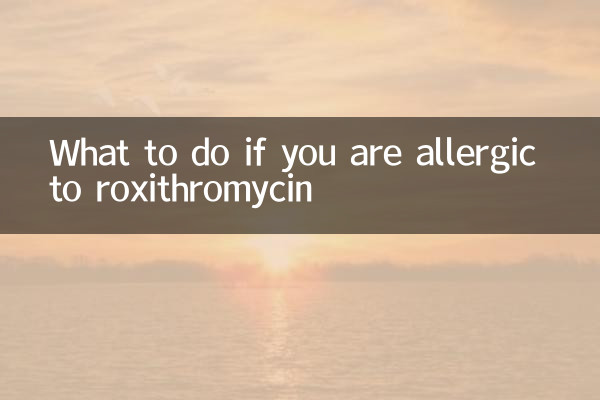What to do if you are allergic to roxithromycin
Roxithromycin is a commonly used antibiotic used to treat bacterial infections. However, some people may experience allergic reactions after taking it. This article will combine the hot topics and hot content on the Internet in the past 10 days to provide you with a detailed analysis of the treatment methods for roxithromycin allergy and provide structured data reference.
1. Common symptoms of roxithromycin allergy

Symptoms of allergic reactions vary from person to person, but the following are common symptoms:
| Symptom type | Specific performance | Severity |
|---|---|---|
| skin reaction | Rash, itching, hives | mild to moderate |
| digestive system reaction | Nausea, vomiting, diarrhea | mild to moderate |
| Respiratory system reaction | Difficulty breathing and swelling of the throat | Severe |
| systemic reaction | Anaphylactic shock (rare) | life-threatening |
2. Emergency measures after allergies
1.Stop medication immediately: After discovering allergic symptoms, stop taking roxithromycin as soon as possible.
2.Assess symptom severity: Determine the level of allergic reaction according to the table above. Mild symptoms can be observed at home, while severe symptoms require immediate medical treatment.
3.home emergency response:
| Symptoms | Treatment method |
|---|---|
| Itchy skin | Apply cold compress to the affected area and apply calamine lotion |
| local rash | Oral antihistamines (such as loratadine) |
| Gastrointestinal discomfort | Drink plenty of fluids and take antiemetics if necessary |
4.Indications for emergency medical treatment: If symptoms such as difficulty breathing, facial swelling, confusion, etc. occur, call the emergency number immediately.
3. Professional treatment plans for medical institutions
According to the latest medical information on the Internet, the standard treatment process for roxithromycin allergies in medical institutions is as follows:
| treatment stage | medical measures | Things to note |
|---|---|---|
| emergency treatment | Adrenaline injection (for severe allergies) | Monitor vital signs |
| drug treatment | intravenous corticosteroids | Observe changes in blood sugar |
| Follow-up management | Prescribe alternative antibiotics | Avoid cross allergies |
4. Prevention recommendations for people with allergies
1.Inform your doctor before taking medication: Those with a history of drug allergy should take the initiative to disclose it.
2.Skin test recommendations: Although roxithromycin skin testing is not a routine requirement, people at high risk can consult their doctor.
3.alternative medicine options:
| Allergy type | Alternative medicines may be considered |
|---|---|
| macrolide allergy | Beta-lactams (skin test required) |
| Allergy to multiple antibiotics | Quinolones (use with caution under 18 years of age) |
5. Answers to relevant questions recently discussed on the Internet
1.Will allergies go away on their own?Mild skin allergies may resolve 2-3 days after stopping the drug, but systemic reactions require medical intervention.
2.Can other antibiotics be used after allergy?It needs to be confirmed through professional allergy testing to avoid cross-allergy to similar drugs.
3.Medication precautions for childrenAccording to the latest pediatric guidelines, children’s medication dosage must be calculated strictly based on body weight. If allergies occur, medication should be discontinued immediately.
6. Special reminder
The data in this article comes from recent hot discussions in the medical and health field, but please refer to your doctor's guidance for specific medication. If you have suspected allergic symptoms, it is recommended to:
1. Take photos of allergic areas to record the development of the disease
2. Keep the drug packaging and instructions
3. Go to the allergy department of a regular hospital in time for treatment
Through the presentation and detailed explanation of the above structured data, we hope to help you better deal with roxithromycin allergy. Remember: drug allergy is no small matter, treat it scientifically to protect your health!

check the details

check the details